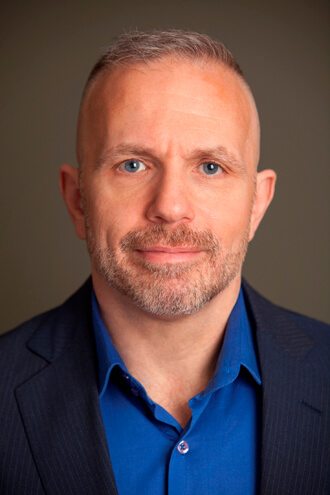Dr. Perry N. Halkitis (front, left) with some of the 15 men he interviewed for his book. | SAM SPOKONY
In the midst of a career built on cutting-edge research about the LGBT population, not to mention a personal life on the front lines of the HIV epidemic, Dr. Perry N. Halkitis isn’t ready to write his autobiography just yet. “Maybe when I’m 60,” he said with a laugh, in his office at New York University’s Global Institute of Public Health, where he serves as associate dean, in addition to his responsibilities as a professor of population health and applied psychology and public health and as director of NYU’s Center for Health, Identity, Behavior and Prevention Studies.
At 50, Halkitis’ goal was to break new ground in the discussion of HIV behavioral studies by publishing a book drawing readers closer than ever into the hearts and minds of men infected with HIV during the early years of the epidemic. “The AIDS Generation: Stories of Survival and Resilience” —published by Oxford University Press this month — is a landmark effort to engage both academics and the general public in a powerful contemplation of what it’s really like to be an HIV-positive man living through middle age.
Halkitis defines the AIDS Generation as gay men who came of age between the late 1970s and the early ’90s, who were diagnosed with HIV as young adults when the diagnosis — before the introduction in 1996 of effective combination antiretroviral treatments — was viewed as a death sentence. The book centers on deeply personal and compelling interviews with 15 men who have survived into middle age and whose words are woven into and around Halkitis’ research and commentary.
New book from Dr. Perry Halkitis probes the resilience of 15 gay men of a certain age
If not autobiography, it is at least the testimony of his own generation. In the book, Halkitis calls it this country’s “bravest generation,” while presenting the stories of his peers — the witnesses of an era — as proof. “There’s something about the behavior of that generation of gay men that was extremely brave, while they were fighting this epidemic within a society that wasn’t embracing gay people, and really still isn’t,” he said.
Readers will revisit — or perhaps learn for the first time about — the absurdly horrifying experience of the early epidemic, when gay men watched their lovers and friends die and those who survived were forced to confront their own mortality at every turn.
“I think that, historically, we tend to forget what actually happened, and instead things tend to become more sanitized,” said Halkitis. “If you go to the New-York Historical Society’s exhibit on the AIDS epidemic, you see that it doesn’t capture the toll. It’s a very whitewashed version of AIDS, and very sweet. But when we were in the middle of this period, it wasn’t sweet. It was disgusting and awful.”
In his interviews and the expert commentary he offers, Halkitis explores ways in which those men came to accept and cope with the knowledge of living with a deadly infection that, at the time, almost invariably overcame efforts at treatment. Some of the 15 men followed paths that led them to take positive control over their personal health, by consistently practicing safe sex or overcoming drug and alcohol addiction. Others dove further into unprotected sex as well as drug use, as a way to escape their emotional burdens. Halkitis shows, however, that all of these men proved resilient and able to survive.
For Halkitis, a defining aspect of putting the book together was the emotions involved in conducting the interviews and then finding authentic ways to piece them together on paper. “After I did the interviews, I kept listening to them and listening to them, because I wanted to hear their voices and I wanted to hear where they stuttered, or paused, or cried,” he said. “And then later, by the fourth or fifth draft of the writing, it had become pretty clear to me how things were coming together. I started to see these commonalities, these groupings of ideas and feelings.”
The writing itself was so powerfully affecting that, at times, Halkitis worried it couldn’t be completed. “I started writing in August [2012], and I was on sabbatical and just sitting at home by myself all day working on it,” he said. “But by the middle of it, in November, it became incredibly difficult, as emotions from the past were just pushing forward. And those feelings actually manifested themselves in a physical way. Parts of my body would hurt, or I would have anxiety while walking down the street. At one point in November I even stopped and put the book aside for a couple of weeks, because I couldn’t deal with the emotions anymore.”
Similar soul-searching confronted the 15 men Halkitis interviewed. “The AIDS Generation” makes clear they recognized that their interviews were not just the cold stuff of academic research. Halkitis bluntly probed the inner sources of their frustrations, struggles, and hopes, and the men often responded just as directly — with intense honesty and often sharp wit and keen self-understanding, all of which help lift their stories up off the page.
“It was really a very healing process for me,” said Lee Raines, 59, whose story is presented, in line with research protocol, under the alias Jackson. “I knew it was going to be a difficult personal journey, because I packed all of these memories away, but this was an important reminder that HIV is not a disease that you can just throw pills at. I had lulled myself into that belief, but I realized that I needed to be reminded of the social and emotional aspects of the disease that are so important to confront.”
Diagnosed in 1989, Raines helped push HIV into the public’s awareness through his involvement with ACT UP and Broadway Cares as well as HIV-related seminars he taught. Though he stepped away from his activism years ago, he said the experience of working with Halkitis has inspired him to begin doing seminars again. “I don’t think I would’ve done that again if it hadn’t been for [Halkitis’] book,” he said.
The tensions between the AIDS Generation and younger gay men was one of the issues the book explores. Halkitis said he challenged the resentments some of his interviewees had toward those in younger generations who ignore safe sex messages.
“The last thing we need these days, as a community, is older gay men pointing their fingers at younger gay men, because the younger men really need those older men to be there for them when it comes to fighting this disease,” said Halkitis. “And I want both older and younger people to question their biases and their belief systems. I want young people to feel like they have access to an older generation of men who might be able to teach them something.”
To be sure, while putting together his book, Halkitis was there for his interviewees. Diagnosed with HIV in 1988, he thought he would die a young man. There was, in his mind, no conceivable hope that he could go on to build a professional career of any kind — especially not one where he would earn academic renown helping in the struggle against HIV.
But he survived.
And while Halkitis’ autobiography is no further along than a title — “The Pet Shop Boys Wrote the Soundtrack of My Life,” he said, laughing — he’s never stopped creating his own story, his own legacy of influence and education. With his new book, he has provided a powerful outlet for men who would otherwise have been kept silent and outside of our nation’s collective history. Halkitis has also never flagged in his pride as a member of the AIDS Generation, men whom he reminds us we all have something to learn from.



































